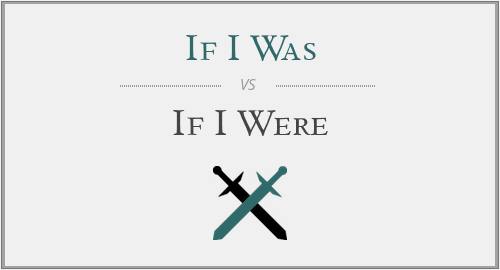
Was vs Were
As simple as that, in past tense, was is used for singular noun/pronoun and were for plural. For example, I was going to the market and we were going to the market.
If I was
This is a situation that could have happened. That’s because it has an ‘if’ clause. If the situation has happened, the result will follow. For example –
- I apologize if I wasn’t clear.
- If he wasn’t such a pain in the ass, we could take him along.
- If I was good, why don’t you select me?
As a general rule, use If I was + adjective + present tense (in the then clause). Each sentence above is true or real and the then clause has the result of the if clause. For example, if I wasn’t clear (which perhaps I wasn’t) – so I apologize. Same way, he probably is a ‘pain in the ass’ and hence we wouldn’t take him along. The third one is a question. We can as well say ‘If I was good, then select me’.
Use ‘if I was’ for real situations that are in indicative mood.
If I were
Used in a subjunctive mood, ‘if I were’ indicates an unreal situation. Something that can never happen. You are imagining a situation, that isn’t true yet or cannot be true.
- If I were Bill Gates, I would be the richest person in the world.
- If I were wrong, I would correct my mistakes.
- If I were invisible, I would steal a lot of chocolates from the supermarket.
Remember, these are hypothetical situations. In general, use If I were + noun + would
Some confusing sentences
If I was present, I would have taken care of the situation. – X (wrong)
If I Was vs. If I Were
The correct sentence should be – if I had been there – because this is a hypothetical situation.
If I was present, I would take care of the situation. – X (wrong)
The situation was not taken care of, so clearly the statement is not true. Hence, we should use ‘were’ and not ‘was’.
If I were present, I would have taken care of the situation – X (wrong)
Again, with ‘were’, you should use would take care of and not participle form (have taken). As a general rule, use participle with participle.
If I were a boy, I would happily roam outside all night.
If I had been a boy, I would have happily roamed outside all night.
There are two differences in the above sentences –
- “I would happily” in the first sentence signifies a future hypothetical action. Though the situation is in the past (if I were), the (hypothetical) action is in future tense.
- The second difference between above sentences is that “if I were” talks about a general hypothetical situation whereas “if I had been” talks about a particular instance, perhaps related to a context. For example – the sentence could be –
“I saw all the boys chatting and enjoying themselves, starting at the moon from the stable. That’s when it struck me – If I had been a boy, I would have happily roamed outside all night too!”
Hope this article helped you understand the difference between if I was and if I were clearly. Try these exercises to figure it out –




Have a discussion about this article with the community:
Report Comment
We're doing our best to make sure our content is useful, accurate and safe.
If by any chance you spot an inappropriate comment while navigating through our website please use this form to let us know, and we'll take care of it shortly.
Attachment
You need to be logged in to favorite.
Log In